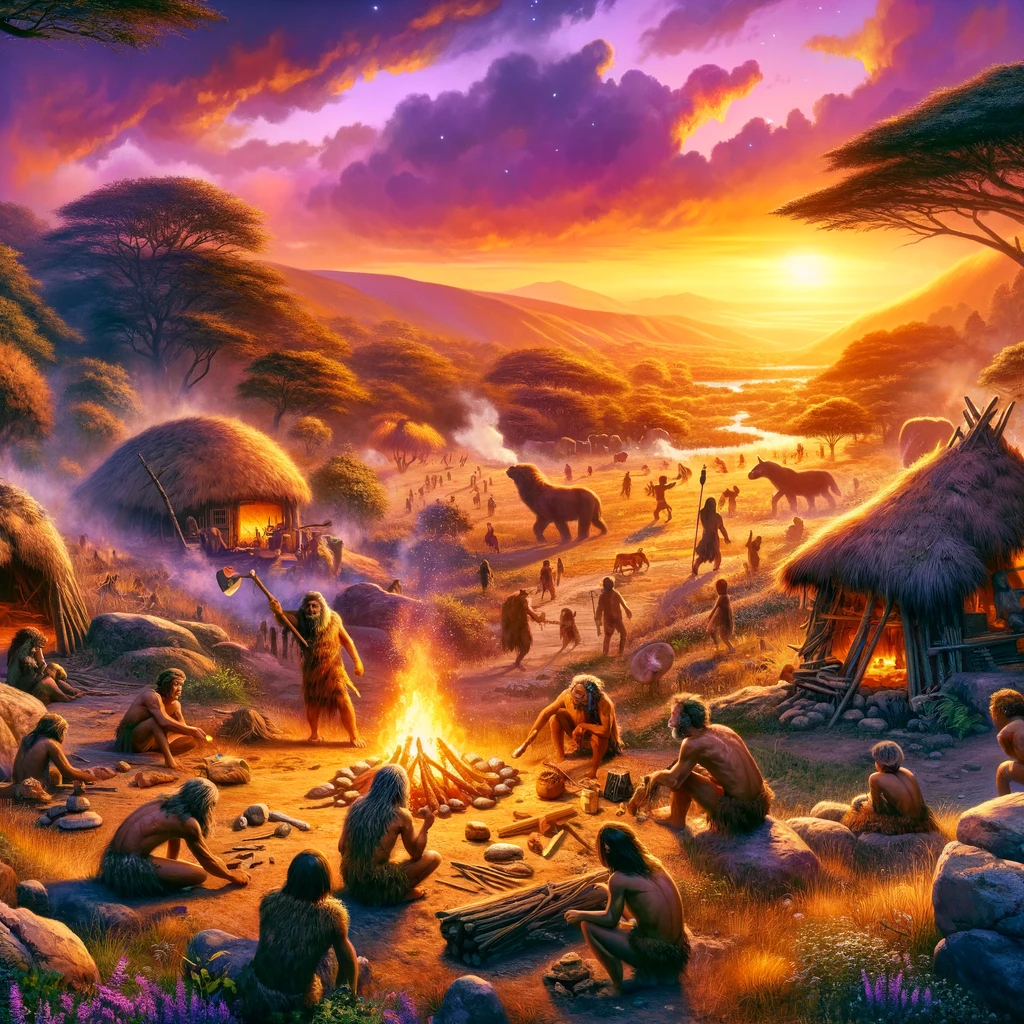let’s talk about some seriously old-school stuff, fam. We’re talkin’ 10,000 years back in the day – a time when our ancestors were just starting to figure out this whole “civilization” thing. Buckle up, ’cause we’re about to take a wild ride through the ancient world, and trust me, it’s gonna be a real hoot.
The Dawn of Agriculture
Alright, so back in the day, our hunter-gatherer ancestors were livin’ that nomadic life, constantly on the move, scavenging for food and whatnot. But then, someone had a bright idea: “Hey, what if we, like, planted some seeds and grew our own grub?” Boom, just like that, agriculture was born.
Imagine this scene: a bunch of cavemen (and cavewomen, of course – we’re all about equality here) huddled around a little patch of dirt, poking at the ground with sticks, and probably looking hella confused. But lo and behold, those little sprouts started popping up, and suddenly, they were onto something big.
Now, I know what you’re thinking: “But Alex, wasn’t agriculture kind of a drag? All that hard work and stuff?” Well, yeah, it was a grind, no doubt. But you gotta remember, these folks were used to chasing down woolly mammoths and fighting off saber-toothed tigers for their next meal. A little bit of gardening probably seemed like a walk in the park in comparison.
The Rise of Permanent Settlements
With this newfangled agriculture business in full swing, our ancestors could finally ditch the nomadic lifestyle and set up shop in one spot. Cue the birth of the first permanent settlements, also known as “villages” or “towns” or whatever you wanna call ’em.
Picture it: a cluster of mud-brick huts, maybe a communal fire pit in the middle, and a whole bunch of folks just hanging out, tending to their crops, and living that village life. No more packing up and moving every few weeks – these people were here to stay.
Now, I know what you’re thinking: “But Alex, didn’t living in close quarters with the same people day in and day out get, like, super annoying?” You bet your sweet bippy it did. I’m sure there were plenty of petty squabbles over whose goat was eating whose crops, or whose kid was throwing rocks at whose hut. But hey, that’s just the price you pay for being a pioneer of civilization, am I right?
The Birth of Organized Religion
With all these people living together in one place, it was only a matter of time before someone started wondering about the big questions in life. You know, the deep stuff: “Why are we here?” “What’s the meaning of it all?” “Who’s gonna clean out the communal latrine this week?”
Enter: organized religion. Yep, our ancient ancestors were the OGs of worshipping deities, performing rituals, and trying to make sense of the great mysteries of the universe. Whether it was praying to the sun god for a bountiful harvest or sacrificing a goat to appease the volcano goddess, these folks were all about that spiritual life.
Now, I’m not gonna lie, some of the practices back then were a little… let’s say, “unorthodox” by today’s standards. Human sacrifice? Check. Animal sacrifices? Double check. Bizarre rituals involving hallucinogenic plants? You better believe it. But hey, who am I to judge? We all gotta find our own path in life, am I right?
The Emergence of Complex Societies
As these early settlements grew and prospered, something interesting started happening: people began to specialize in different roles and tasks. Suddenly, you had farmers, potters, weavers, and all sorts of other professions popping up left and right.
It was like a real-life version of that game “Civilization” that all the nerds used to play back in the day (no shade, though – I was totally one of those nerds). One dude was busy tilling the fields, while his neighbor was busy throwing pots on the ol’ pottery wheel. And over in the next hut, some clever chap was figuring out how to weave baskets out of reeds.
With all these specialized roles came a need for organization and leadership. Enter: the first complex societies, complete with hierarchies, rules, and even (gasp!) taxes. Yep, our ancient ancestors were the OGs of getting taxed to the Stone Age.
Now, I can hear you grumbling already: “Ugh, taxes? What a drag.” But think about it this way: those taxes were probably paying for things like communal granaries, defensive walls, and maybe even the occasional feast or celebration. Hey, you gotta treat yourself every once in a while, right?
The Dawn of Art and Culture
Alright, so we’ve covered the practical stuff – agriculture, settlements, religion, and all that jazz. But what about the fun stuff? You know, the arts, culture, and general shenanigans that make life worth living?
Well, my friends, our ancient ancestors had that covered too. From the earliest cave paintings (which were basically just prehistoric graffiti, let’s be real) to the birth of music and dance, these folks knew how to get their groove on.
Imagine a warm summer evening, the smell of woodsmoke in the air, and a group of villagers gathered around a crackling fire, pounding out rhythms on drums made of stretched animal hides. Maybe someone’s chanting a ancient hymn or telling a epic tale of the time Old Man Jenkins wrestled a woolly rhino (or something like that).
Sure, it might not have been the height of sophistication by today’s standards, but you gotta respect the hustle, you know? These people were literally inventing culture from scratch, laying the foundations for everything from theater to poetry to that weird experimental dance troupe that performs at your local coffee shop every Thursday night.
The Legacy of Ancient Civilizations
Alright, so we’ve covered a lot of ground here, from the dawn of agriculture to the birth of complex societies and everything in between. But what’s the takeaway, you ask? What’s the legacy of these ancient civilizations that sprouted up 10,000 years ago?
Well, for starters, they paved the way for pretty much everything we know and love about modern society. Sure, we’ve come a long way since those mud-brick villages and cave paintings, but we owe a debt of gratitude to our ancient ancestors for laying the groundwork.
Think about it: without those early pioneers figuring out how to domesticate plants and animals, we might still be wandering the plains, chasing down wooly mammoths for our next meal. Without those first permanent settlements, we might never have developed things like specialized professions, organized religion, and (shudder) taxes.
But beyond the practical stuff, these ancient civilizations left us with something even more valuable: a rich cultural heritage that spans millennia. From the epic myths and legends passed down through oral traditions, to the awe-inspiring ruins of ancient cities that still stand today, we’re constantly reminded of the incredible ingenuity and resilience of our ancestors.
CONCLUSION
So next time you’re sitting around the campfire (or, you know, the modern equivalent), raise a glass to those intrepid folks who first started putting down roots all those thousands of years ago. They might not have had all the fancy tech and conveniences we enjoy today, but they had something even more valuable: the courage and curiosity to build something new, something lasting, something that would eventually become the foundation of every great civilization that followed.
And who knows? Maybe 10,000 years from now, some wise-cracking historian will be regaling their audience with tales of our own quirky ancestors and the bizarre customs we practiced back in the early 21st century. Just give me a shout-out when you do, okay?

